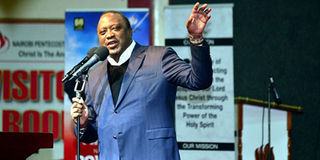Vote of confidence as IMF approves of Uhuru’s reforms

President Uhuru Kenyatta at a past event. PHOTO | FILE | NATION MEDIA GROUP
What you need to know:
Kenya’s President Uhuru Kenyatta’s purge against graft is working, and Kenya’s fight against corruption is inspired by international best practices.
Mr Selassie also declared that Kenya’s economic growth is stable and on a high level, with an expected 6 per cent for 2019.
Every child knows why we need referees in sport. Remember the legendary French captain Zinedine Zidane’s headbutt in the 2006 World Cup Final? He was obviously provoked by a harsh insult.
It was an incredibly tough call, and only an objective outsider could be trusted to make a fair judgement.
These judgements, which can decide the outcome of a game, are clearly something that international sport is grappling with. Just one that is perceived as unfair can turn hundreds of thousands of fans against your organisation in a second. Hence, FIFA, the world football governing body has started to employ the video assisted refereeing (VAR) in all games.
But there are also areas besides sport which also require objective voices, universally respected voices.
INTERNATIONAL RELATIONS
One of the most difficult areas to implement this is in international relations. As the famous saying goes, one man’s terrorist is another man’s freedom fighter.
Thus, towards the end of World War Two, the Allies set out to draw up a new world order with institutions that could render objective judgements. Institutions that everyone would listen to.
In the economic field, the famous British economist John Maynard Keynes drew up theoretical sketches that were the foundations for the discussions at Bretton Woods, New Hampshire, in 1944.
It was at this conference that the Allies decided on institutions which would help international economic cooperation, speed up the reconstruction of war-damaged countries and to create the International Monetary Fund (IMF), whose original goal was to promote stability of exchange rates and financial flows.
Over time, the IMF developed, and it now focusses on fostering global monetary cooperation, securing financial stability, facilitating international trade and promoting high employment and sustainable economic growth.
It works towards these goals by gathering statistics and analysis of economic development the world over, surveying its members' economies, and advocating for particular policies.
Through its close cooperation with the World Bank, the IMF can bail out countries who enact proper reforms, and close the faucet of cash-influx to governments exploiting their citizens.
ECONOMIC REFORMS
Thus, the IMF is the global referee on national economic policy. And we were just awarded a great score on our report card! Abebe Selassie, Director for African Departments at the IMF, confirmed what is obvious to everyone following the news diligently: Kenya’s President Uhuru Kenyatta’s purge against graft is working, and Kenya’s fight against corruption is inspired by international best practices.
At the same meeting at State House, Mr Selassie also declared that Kenya’s economic growth is stable and on a high level, with an expected 6 per cent for 2019. This would be impossible without the repatriation of funds, the fight against black money through the introduction of a new currency, and the Ethics and Anti-Corruption Commission’s (EACC) iron-clad fist in its fight against economic criminals.
It is important to note that economic growth goes hand in hand with anti-corruption campaigns. We can’t expect our country’s economy to grow significantly when all the profits are embezzled by criminals. That’s why the prevalence of graft is a strategic threat for the future of Kenya. Our president seems to understand this and acts accordingly.
The least we can offer as the citizenry is grant Uhuru our confidence. Even though some individuals don’t feel the effects of his policies in their daily lives, objective international organisations tell us that they are working. We can thus infer that his other projects, be it the Big Four, the BBI or the SGR, are equally successful.
They all spring from the same intention: to leave a legacy of growth, development and justice that positively impacts the life of all Kenyans.
SUCCESS
Everywhere you look, there are more and more indicators of Uhuru’s success. Even though on a global level Foreign Direct Investments (FDI) are slumping, flows to Kenya increased by an incredible 27 per cent in the last year, well above the African average of 11 per cent. Similarly, Kenya rose another 5 places in the Organisation for Economic Co-operation and Development (OECD)’s 2020 Ease of Doing Business Index, and an astonishing increase of 80 places since 2014.
We are now ranked 56th out of 190 nations in the world, and second in continental sub-Saharan Africa, behind Rwanda.
Local and foreign investors already see that the improvements in governance and infrastructure the President is planning and executing will make Kenya one of the most attractive economies in the years to come. And if we keep on this track, the positive effects on all of our lives will surely follow.
Mr Mugolla comments on topical issues. Email:[email protected]





